Muhtemelen WordPress'in internetteki tüm web sitelerinin %43'ünden fazlasına güç verdiğini biliyorsunuzdur. Bu oldukça etkileyici, ancak piyasadaki tek açık kaynaklı içerik yönetim sistemi (CMS) bu değil. Keşfedilmeye değer birkaç başka seçenek de var.
Web siteleri oluşturmaya başladığımızda, Joomla ve Drupal gibi diğer popüler platformları derinlemesine inceledik. Ve tüm projelerimiz için her zaman WordPress kullanmayı tercih etmiş olsak da, bazılarının farklı bir şey aradığını anlıyoruz.
Bu makalede WordPress, Joomla ve Drupal'ı karşılaştıracağız. Neleri sevdiğimizi ve neleri sevmediğimizi açıklayacağız, böylece sizin için en uygun olanın hangisi olduğuna karar vermenize yardımcı olacağız ihtiyaçlarınız.
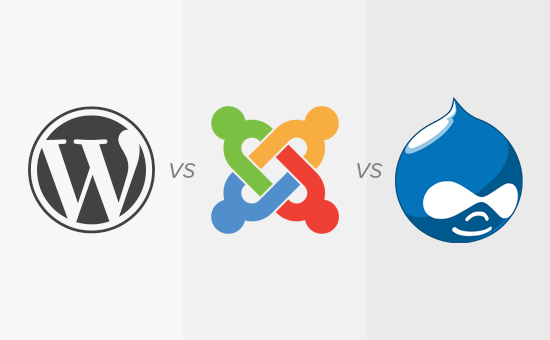
Not: WordPress.com barındırma hizmetini değil, WordPress.org'u karşılaştırıyoruz. Lütfen WordPress.org ve WordPress.com arasındaki fark hakkındaki rehberimize bakın.
WordPress, Joomla ve Drupal'da Ortak Olan Nedir
İnternetin en popüler üç CMS'si teknoloji, felsefe ve topluluk açısından pek çok ortak noktaya sahiptir.
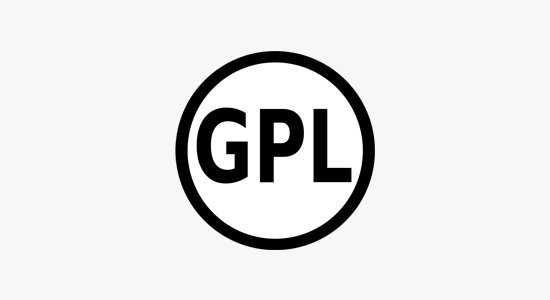
- WordPress, Joomla ve Drupal ücretsiz ve GPL lisansı altında açık kaynaklı yazılımlardır. Ücretsiz yazılımlar hakkında daha fazla bilgi edinmek için WordPress'in neden ücretsiz olduğu hakkındaki makalemize göz atın.
- Her üçü de öncelikli olarak PHP ile yazılmıştır.
- Hepsi veritabanı yönetim sistemi olarak MySQL'i destekler. WordPress yalnızca MySQL'i desteklerken, Joomla ve Drupal diğer veritabanı yönetim sistemlerini destekler.
- Hepsi sitelerin görsel görünümü için temalar ve şablonlar, ve özellikleri genişletmek için eklentiler, modüller veya uzantılar kullanır.
- Açık kaynaklı yazılım olarak hepsi topluluk tarafından yönlendirilen projelerdir.
Birçok benzerlik olsa da, birçok yönden farklıdırlar.
Örneğin, çekirdek yazılıma nelerin dahil edileceği, modüllerin ve şablonların nasıl ele alınacağı, güvenliğin nasıl sağlanacağı vb. konusunda farklı politikaları var.
Bu farklılıklar, kullanıcılar ve web sitelerini nasıl oluşturdukları üzerinde büyük bir etkiye sahiptir.
Having that said, let’s take a look at how WordPress, Joomla and Drupal compare to each other, so you can choose the best website builder platform for your business.
Kullanım Kolaylığı ve Başlangıç Dostu
Web sitelerini oluşturan çoğu insan web geliştiricisi, tasarımcı veya programcı değildir. Onlar sadece bir web sitesi oluşturmak isteyen ortalama kullanıcılardır. Kullanım kolaylığı, kullanıcıların çoğunluğu için en önemli faktördür.
Wordpress
WordPress, ünlü bir beş dakikalık kurulum ile birlikte gelir. Çoğu WordPress barındırma sağlayıcısı da WordPress'in tek tıklamayla kurulumunu sunar. Bu, yeni bir kullanıcının saatler değil, dakikalar içinde bir WordPress blogu veya web sitesi başlatmasını oldukça kolaylaştırır.
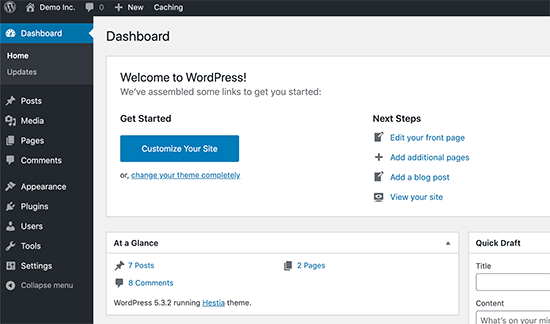
WordPress'in kurulum sonrası kullanıcı deneyimi, Joomla veya Drupal'dan çok daha iyi. Kullanıcı, gönderi ve sayfa oluşturmak veya görünüm ve temaları özelleştirmeye başlamak için menülere sahip basit, temiz bir kullanıcı arayüzü görüyor.
Joomla
Joomla kurulumu WordPress kadar hızlı görünmeyebilir, ancak çok benzer adımlara sahiptir. Bunun dışında birçok paylaşımlı barındırma sağlayıcısı Joomla için de tek tıklamayla kurulum paketleri sunmaktadır.
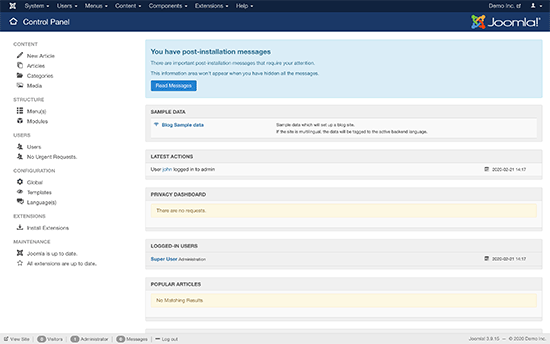
Kurulumdan sonra kullanıcı, WordPress kadar anlaşılır olmayan bir kontrol paneline iner. Siteyi özelleştirmek için tıklanacak çok fazla menü var.
Joomla hayranları, bunun Joomla'nın WordPress'ten çok daha güçlü olmasından kaynaklandığını söyleyecektir, ancak biz buna inanmıyoruz.
Drupal
Drupal'ın kurulumu hem Joomla hem de WordPress'e benzer. Paketi indirip yükleyin ve kurulum betiğini çalıştırın.
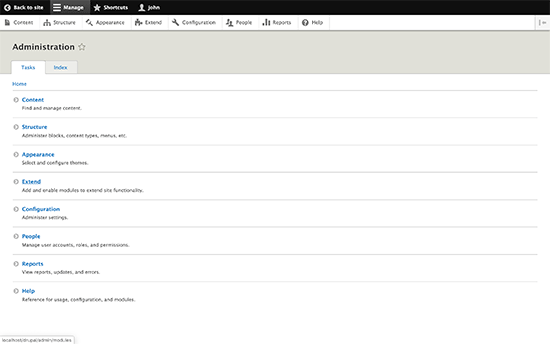
Drupal ayrıca dağıtımlar da sunar. Bunlar, belirli web sitesi türleri oluşturmak için modüller ve yapılandırmalar içeren önceden paketlenmiş Drupal paketleridir.
Yeni başlayanlar için kurulum sonrası deneyim biraz karmaşık. Kullanıcılar sitelerindeki şeyleri nasıl değiştireceklerini anlamakta zorlanacaklar. Drupal, içeriği nasıl ekleyeceğinizi çok net gösteriyor, ancak görünümü değiştirmek ve içerik dışı öğeler eklemek pek belirgin değil.
Kazanan: WordPress
Temalar ve Eklentiler
Bu popüler CMS'lerin üçü de yazılımın özelliklerini ve görünümünü genişletmek için temalar ve eklentiler/modüller ile birlikte gelir.
Temalar web sitenizin görünümünü ve kullanıcılarınıza nasıl göründüğünü kontrol eder. Eklentiler veya Modüller, CMS'niz için uygulamalar gibidir.
Bu üç büyük CMS yazılımının bu kategoride nasıl performans gösterdiğini görelim.
Wordpress
WordPress, kullanıcıların sitelerinin görünümünü temalar kullanarak değiştirmelerine olanak tanır. WordPress, önceden yüklenmiş birkaç varsayılan tema ile birlikte gelir.
Görünüm sayfanızdan istediğiniz zaman yeni ekle düğmesine tıklayabilir ve resmi WordPress.org tema dizininden ücretsiz WordPress temaları yükleyebilirsiniz.

Ücretsiz temaların yanı sıra, StudioPress, Elegant Themes gibi üçüncü taraf tema mağazaları tarafından geliştirilmiş çok daha fazla premium WordPress teması bulacaksınız. Bunlar ücretli temalardır ve premium destek seçenekleriyle birlikte gelirler.
WordPress'in gerçek gücü eklentilerde yatar. Resmi WordPress eklenti dizininde ücretsiz olarak 59.000'den fazla WordPress eklentisi bulunmaktadır. Ayrıca, eklenti geliştiricileri tarafından sağlanan ücretli destekle gelen premium eklentiler de satın alabilirsiniz. Eklentilerin WordPress'i nasıl harika hale getirdiğini görmek için olmazsa olmaz WordPress eklentileri listemize göz atın.
Joomla
WordPress gibi Joomla da şablonlar ve uzantılarla birlikte gelir. Bu harika uzantılar, bir e-ticaret mağazası oluşturmaktan e-postayı yönetmeye kadar hemen hemen her şeyi yapabilir.
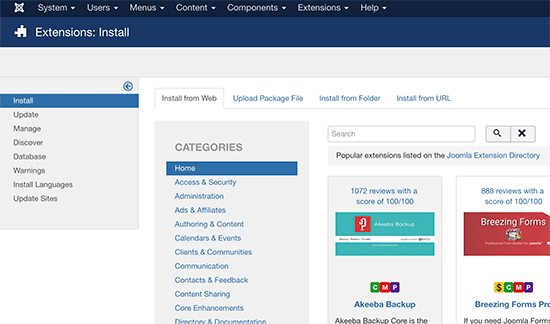
Ancak, bu şablonların ve uzantıların miktarı WordPress kadar yüksek değil. Bu, mükemmel şablonu ve mükemmel uzantıları bulmayı biraz zorlaştırabilir.
Varsayılan olarak Joomla, kullanıcıların yönetim alanından uzantıları veya şablonları arayıp yüklemelerine olanak tanıyan bir özelliğe sahip değildir. Uzantılar için "web'den yükle" özelliği eklemenize olanak tanıyan bir uzantı vardır. Ancak şablonlar için kullanıcıların hala şablonları manuel olarak aramaları ve ardından URL'lerini ekleyerek yüklemeleri gerekecektir.
Drupal
Drupal'ın tema ve modül kullanılabilirliği konusunda da aynı sorunu var. Kullanıcıların sitelerinden ayrılmaları, eklemek istedikleri modülü ve temayı aramaları ve ardından projenin zip dosyasının URL'sini bulmaları gerekecektir. Son olarak, bunları yüklemek için URL'yi Modüller veya Temalar sayfasında girebilirler.
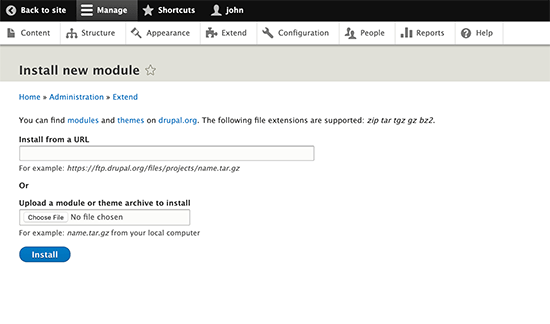
Hemen hemen her şeyi yapan modüller var ve düzenli olarak yenileri ekleniyor. Yine de, WordPress ile karşılaştırıldığında modüllerin genel miktarı yetersiz kalıyor.
Kazanan: WordPress.
Destek Seçenekleri
The availability of help and support options is very important for beginner users. There will surely be some hurdles when you are trying new software. That’s ok as long as you can get help.
Wordpress
WordPress'in güçlü bir kullanıcı topluluğu var. WordPress yardımını resmi destek forumlarında, belgelerde, kılavuzlarda, codex'te, Slack kanallarında, Stack Exchange'de, WPBeginner Engage Facebook grubunda ve internetteki web tasarımı ve geliştirme ile ilgili hemen hemen her forumda bulabilirsiniz.
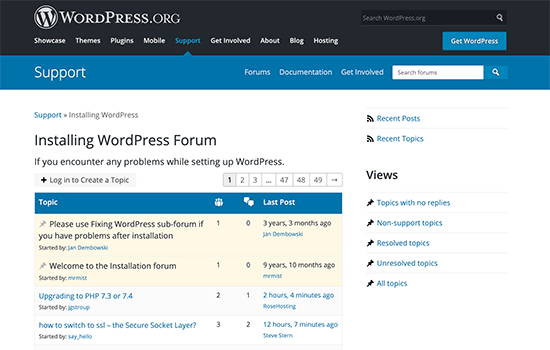
WPBeginner gibi, yüzlerce öğretici, video eğitimleri ve başlangıç seviyesindeki WordPress kullanıcılarına yönelik makaleler içeren siteler bulunmaktadır. Ücretsiz WordPress desteği istemenin ve almanın birçok yolu vardır.
Ücretsiz destek seçeneklerinin yanı sıra, WordPress için ücretli destek almanın da yolları vardır.
Codeable, Upwork ve Fiverr gibi çevrimiçi platformlar, WordPress profesyonellerini işe alabileceğiniz yerlerden sadece birkaçı.
WordPress'in muazzam popülaritesi nedeniyle, WordPress geliştiricileri bulmak küçük işletmeler ve bireyler için kolay ve uygun fiyatlıdır.
Joomla
Joomla, WordPress gibi, büyük ve çok yardımcı bir topluluğa sahiptir. Joomla web sitesi, yeni başlayanlar için değerli bir kaynak olan kapsamlı belgelere sahiptir. Daha etkileşimli destek için kullanıcılar forumlara, posta listelerine, kullanıcı gruplarına vb. katılabilir.
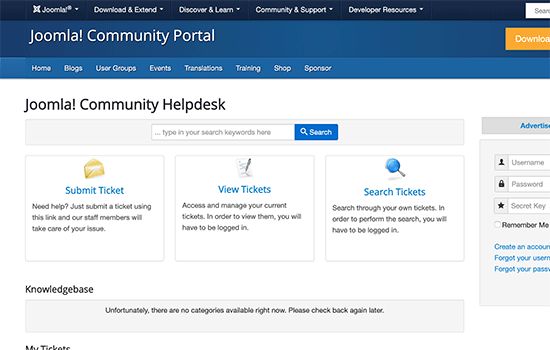
Topluluk desteğinin yanı sıra, üçüncü taraf kaynaklar, ücretli eğitimler ve yardımcı olabilecek geliştirme ajansları bulunmaktadır.
WordPress'in aksine, Joomla için uygun fiyatlı uzman yardımı bulmak oldukça zordur. Joomla geliştirme, sorun giderme veya yardım için bir geliştirici veya uzman kiralamak, WordPress'ten çok daha pahalıya mal olabilir.
Drupal
Drupal'ın çok proaktif bir hayran ve kullanıcı topluluğu var. WordPress ve Joomla gibi, Drupal için de tüm topluluk destek seçeneklerini bulacaksınız. Kapsamlı belgeler, bir destek forumu, posta listeleri, kullanıcı grupları ve IRC sohbet odaları var - hepsi tavsiye ve ücretsiz yardım almak için iyi yerler.
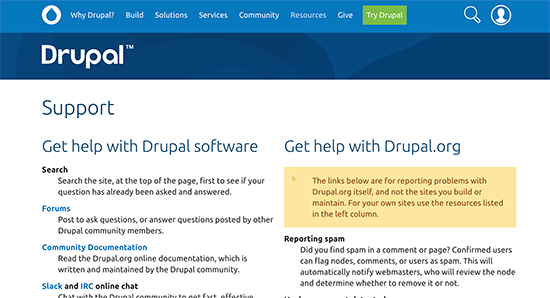
Drupal, kullanıcıları profesyonel Drupal hizmetleri sunan geliştiricilere ve şirketlere bağlamaya çalışır. Onları Drupal Marketplace'te bulabilirsiniz.
Ancak, Drupal geliştiricileri, Joomla'ya benzer şekilde, WordPress ile karşılaştırıldığında çok pahalıdır.
Kazanan: WordPress
Yerelleştirme ve Çok Dilli Destek
Her gün oluşturulan web sitelerinin büyük bir yüzdesi İngilizce olmayan veya çok dilli sitelerdir. Birçok aceminin muhtemelen birden fazla dili destekleyebilen veya farklı yerel ayarlar ve diller için desteği olan bir CMS arayacağı daha olasıdır.
Wordpress
WordPress does an excellent job of offering a good platform to build a multilingual site. It does not support multiple languages out of the box, but there are some excellent plugins that allow you to easily create a WordPress multilingual site.
WordPress 57'den fazla dilde mevcuttur. WordPress yönetici alanından tek bir tıklamayla yeni diller yüklenebilir.
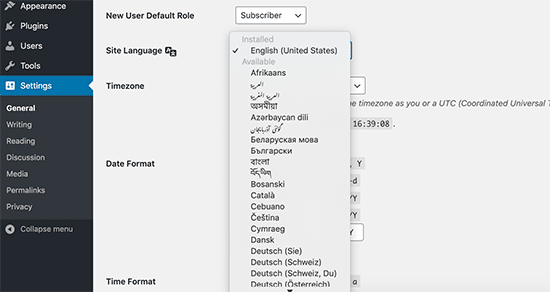
En popüler temalar ve eklentiler de birden fazla dilde mevcuttur ve tema ve eklenti geliştiricileri, paketlerini başka dillere çevirmek için aktif olarak yardım aramaktadır.
Tüm bu çabalar, WordPress'i İngilizce olmayan veya çok dilli bir web sitesi oluşturmak için harika bir platform haline getiriyor.
Joomla
Joomla, herhangi bir uzantı yüklemeden çok dilli bir web sitesini yönetme yeteneğiyle birlikte gelir. Sadece dil yöneticisine gidin, bir içerik dili ekleyin ve web sitenizde çok dilli içerik oluşturmaya başlayın.
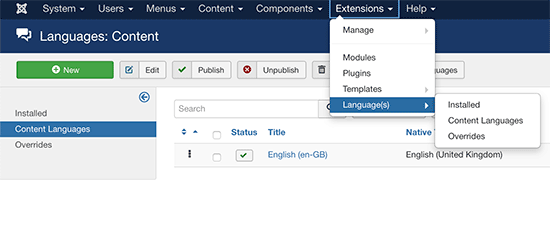
Yönetici arayüzü için de birçok dilde çeviriler mevcuttur ve yönetici alanından kolayca kurulabilir.
Drupal
Drupal, İngilizce olmayan veya çok dilli siteleri yönetmek için yerleşik destekle birlikte gelir. Yerel ve içerik çevirisi modüllerini etkinleştirmeniz gerekecektir. Bundan sonra, Drupal'ın yapılandırma bölümünden site ve yönetici arayüzü dillerini ekleyebilirsiniz.
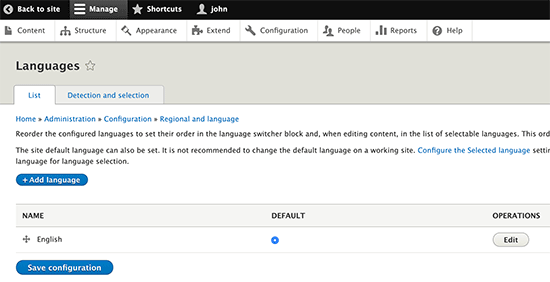
Kazanan: Berabere – Her üçü de çok dilli siteleri destekler ve birden fazla dilde mevcuttur.
Güvenlik
Web siteniz için bir CMS seçerken güvenlik çok önemli bir faktördür. İnternetteki neredeyse her web sitesi güvenlik tehditlerine karşı savunmasızdır.
Wordpress
As the most popular CMS in the world, WordPress-based websites are often targeted by hackers. However, WordPress is built on very secure code and responds to security vulnerabilities very quickly.
WordPress ayrıca, yeni bir güvenlik yaması yayınlandığında WordPress web sitelerinin otomatik olarak güncellenmesine olanak tanıyan bir otomatik güncelleme mekanizmasına sahiptir.
WordPress siteleri, otomatik yedeklemeler, iki faktörlü kimlik doğrulama ve diğer WordPress güvenlik en iyi uygulamaları ile daha da güvenli hale getirilebilir.
WordPress temaları ve eklentileri için güncellemeleri göstermek üzere yerleşik bir mekanizma da bulunmaktadır. Bu, tema ve eklenti geliştiricilerinin herhangi bir güvenlik açığına hızla yanıt vermesini sağlar.
Joomla
Joomla, güvenlik açısından WordPress'e çok benzer. Herhangi bir güvenlik açığına aktif olarak yanıt verirler ve onu hızla yamalarlar. Ancak, bir web sitesini sürdürmek ve güncellemeleri yüklemek hala kullanıcıya aittir.
Joomla sitenizi yedeklemek için kullanabileceğiniz uzantılar mevcuttur. WordPress ile aynı en iyi uygulamaları izleyerek Joomla sitenizin güvenliğini de güçlendirebilirsiniz.
Drupal
Drupal güvenliğe çok ciddi yaklaşıyor. Güvenlik açıkları keşfedildikçe ve yamalandıkça kendi sitelerinde yayınlıyorlar. Drupal'ın daha güvenli olduğuna dair bir algı var çünkü Drupal sitelerinin hacklendiğini o kadar sık duymuyorsunuz, ancak bu Joomla veya WordPress kadar popüler olmamasından kaynaklanıyor olabilir.
Kazanan: Beraberlik – Her üçü de uygun güvenlik standartlarını takip ediyor.
Sonuç:
Drupal, Joomla ve WordPress harika içerik yönetim sistemleridir. Drupal ve Joomla, WordPress'ten çok daha fazla yerleşik özelliğe sahiptir.
Ancak WordPress, kullanım kolaylığı, devasa küresel topluluğu, eklentileri ve temalarıyla onlardan daha iyi. Geliştirici olmayan çoğu kullanıcının Joomla veya Drupal'dan daha kolay bir şekilde WordPress ile site kurabileceğini düşünüyoruz.
59.000'den fazla WordPress eklentisiyle, hemen hemen her özelliği ekleyebilir veya herhangi bir türde web sitesi oluşturabilirsiniz (kod yazmadan).
Genel Kazanan: WordPress
En Sevdiğiniz CMS'ye Nasıl Başlanır
WordPress, Joomla veya Drupal'ı seçerseniz, bir web sitesi oluşturmak için bir alan adına ve web barındırmaya ihtiyacınız olacaktır.
Neyse ki, bu üç üst düzey CMS yazılımının da oldukça benzer gereksinimleri var, bu da tüm üst düzey web barındırma şirketlerinin onları desteklediği anlamına geliyor.
Ya Bluehost ya da SiteGround kullanmanızı öneririz. Her ikisi de dünyanın en büyük barındırma şirketleri arasındadır ve WordPress, Joomla ve Drupal web sitelerini barındırma konusunda uzmanlaşmıştır.
Daha fazla öneri için, yeni başlayanlar için hazırladığımız kapsamlı web hosting rehberimize bakın.
WordPress ile başlıyorsanız, adım adım talimatlarla web sitesi nasıl yapılır konulu başlangıç rehberimize göz atın.
Umuyoruz ki bu makale WordPress vs Joomla vs Drupal karşılaştırmasında size yardımcı olmuştur ve siteniz için en iyi CMS'yi bulmanızı sağlamıştır. Ayrıca WordPress vs. Blogger karşılaştırmamıza veya CMS olarak WordPress kullanan popüler siteler vitrinimize de göz atmak isteyebilirsiniz.
Bu makaleyi beğendiyseniz, lütfen WordPress video eğitimleri için YouTube Kanalımıza abone olun. Bizi ayrıca Twitter ve Facebook'ta da bulabilirsiniz.





mohadese esmaeeli
Elbette, herhangi bir CMS savaşına karışma niyetim yok. Ancak deneyimlerime dayanarak (3 yıl Joomla ile çalıştığım için), WordPress büyük web siteleri için herhangi bir alanda daha iyi geri bildirim sağlayabilir. Tipik olarak ve kanıtlanmış olarak, dünya çapındaki web sitelerinin %60'ından fazlası WordPress kullanırken, Joomla %15'ten az kullanıyor. Genel olarak, WordPress'in kendine ait güzel bir dünyası var. Elbette, bir içerik yönetim sistemi seçmeden önce web sitesinin doğasını göz önünde bulundurmalıyız. Yine de, WordPress'in yaptığı harika gelişmeleri ve büyük küresel şirketler tarafından geliştirilen eklentileri göz önüne alındığında, WordPress artık her türlü web sitesi için kullanılabilir.
Jiří Vaněk
Üç yayın sistemini de denedim ve kendi deneyimime göre wordpress, özellikle yeni başlayanların web sitesiyle nasıl çalışacaklarını öğrenmeleri ve temel prensipleri anlamaları için iyidir. Wordpress bana en çok yönlü gelen ve en önemlisi, bir sorun olması durumunda sorunu ücretsiz çözmekten mutluluk duyan devasa bir kullanıcı tabanına sahip.
Priya Sinha
Gönderi için teşekkürler, WordPress vs. Joomla vs drupal hangisi daha iyi olur hakkında güzel bilgiler… Gerçekten yardımcı oldu. Başkalarına tavsiye edeceğim.
WPBeginner Desteği
Glad you found our comparison article helpful!
Yönetici
Tom Hardy
Harika bilgi! Deneyimlerime dayanarak, bence WordPress, son derece özelleştirilebilir en kolay içerik yönetim sistemidir. Diğer yandan, Drupal karmaşıktır ancak gelişmiş web siteleri oluşturmak için en iyisidir; aynı zamanda çok güvenli bir CMS'dir. Joomla, bu iki CMS'nin arasında özelleştirilebilirlik, kullanım kolaylığı ve güvenlik açısından yer alır.
WPBeginner Desteği
Thanks for sharing your opinion
Yönetici
Duane Hamann
Bence bu makale haklı. Saygın, yönetilen bir web sitesi kurmak isteyen yeteneksiz kişi için Wordpress en iyi seçenektir. Ancak Joomla'nın aştığı sınırlara sahiptir. CMS geliştirme konusunda yetenekli biri için, özel geliştirilmiş bileşenlerle esnekliği nedeniyle Joomla #1 sırada yer alır, çok daha tekniktir, bu yüzden iyi ve anlaşılması kolay bir şey arayan kişi için Wordpress kazanır. Ancak bu, Wordpress'i Joomla ile karşılaştırıldığında parlatmıyor. Hepsi, geliştirme becerisi olmayanlar için Wordpress'in en iyisi olduğunu söylüyor. PHP uygulamaları geliştirenler için Joomla daha uyarlanabilir ve esnektir, bu yüzden hepsi bireysel becerilere bağlıdır.
Geniş
Çok sayıda site oluşturdum ve üç rakibin de hepsini kullandım. Joomla'yı özellikle daha büyük karmaşık siteler için kullanmak en çok yönlü ve çevik buluyorum.
Ancak küçük siteler için bile Joomla'yı kullanmak süper kolay.
Bence WordPress blog yazmak ve yorum yapmak için daha uygun ve küçük siteler için de iyi. Sadece Joomla kadar ince ayar yapmak kolay değil.
Ronald
Bir web sayfası için karmaşık olmayan ve sınırlı bir şey istiyorsanız wordpress kullanın.
Web sitesi geliştirmek için karmaşık ve sınırlı olmayan bir şey istiyorsanız Drupal kullanın.
Drupal daha iyi!
Okanime
Bir web tasarımcısı gibi davranan bilgisayardan anlayan bir adamı nasıl anlarsınız – size sitenizi bir wordpress CMS ile inşa edeceğini söylediğinde. Joomla'yı kullanmak veya sürdürmek zor geliyorsa, cidden herhangi bir elektronik cihaz kullanmayı bırakmalısınız. Hepimize bu iyiliği yapmak sizin görevinizdir.
Mark
Wordpress hakkında bir web sitesi, Wordpress'in en iyisi olduğunu söylüyor… Ne sürpriz…
Jiten
2010'dan beri Wordpress kullanıyordum. Bir web tasarımcısı olarak her zaman WP'de web sitesi tasarlar ve teslim ederim, ancak birkaç yıl önce bazı web siteleri hacklendi. Web siteniz hacklendiğinde, enfeksiyonu tamamen kaldırmanın tek bir çözümü olduğunu unutmayın: "HER ŞEYİ SİLİN" çünkü bir kez saldırıya uğradığınızda hiçbir eklenti her şeyi temizleyemez.
Şimdi WP'den Joomla'ya geçiyorum.
Okanime
Joomla güzel. Neden kötü bir şöhrete sahip olduğunu anlamıyorum. Joomla 3.x artık her açıdan WordPress'ten çok daha iyi.
Duarte
Drupal ve Wordpress'i karşılaştırmak, bir arabayı bir tekneyle veya elmayı soğana karşılaştırmak gibidir. Her ikisi de kendi alanlarında en iyisidir. Çeşitli faktörlere bağlı olarak birini veya diğerini kullanmalısınız, ancak bu başka bir makale için olmalı.
İkisini de kullanıyorum ve benim için WP'nin pek iyi olmadığı bir şey eklentiler. WP'nin binlerce harika eklentisi olduğu doğru, ancak çoğu işlevsellik açısından tekrar ediyor ve diğerleri fremmium, yani tam ürün istiyorsanız ödeme yapmanız gerekiyor. Ayrıca ölçeklenebilirlik düşünülmeden anahtar teslimi çözümler olma eğilimindedirler. Ve temalar için de aynı şey oluyor.
Drupal'in tekrarlanan katkıda bulunulan modüllere karşı katı bir politikası vardır ve hepsi ücretsizdir (Açık Kaynak), ücretsiz premium modüllere veya temalara izin verilmez. Drupal'deki modüller daha çok temel gibidir, böylece kendi kodunuzla veya diğer modüllerle işlevsellik geliştirebilirsiniz. Drupal modüllerinin iyi bir kısmı görünür çıktılara sahip değildir, yalnızca işlevler arasında arka uç bağlantıları olarak hizmet eder.
Joomla hakkında konuşamam. Tecrübem yok.
Mark
WP'nin temalar ve eklentiler açısından açık ara en geniş yelpazeye sahip olmasına rağmen, temalarının çoğu saf tekrarlar ve kopyalamalardır, genel olarak sıkıcıdır ve çok az yaratıcılık kullanılarak oluşturulmuştur.
Aynı şey WP eklentileri için de geçerli. İşleri daha da kötüleştirmek için, her biri bozuk web sitenizin "başka bir" eklentinin sonucu olduğunu iddia eden, kendileriyle hiçbir ilgisi olmadığını garanti eden bir grup suçu başkasına atan eklenti geliştiricisiyle tartışmak zorundasınız.
"Çok fazla aşçı yemeği bozar" sözünü duydunuz mu?
Bu, WP için %100 geçerlidir.
Gezegendeki son CMS olmasa bile WP'yi asla kullanmazdım. Hatalarla dolu, uyumsuz eklentiler, büyük güvenlik açıkları, cansız tasarımlar ve hepsi "profesyonel web programcıları" olduklarını iddia eden bir milyon yeteneksiz kod korsanı.
Sam
I totally agree with you.
Paul
I’ve never had any security issues with WordPress, and regarding “lifeless designs” – if you have the relevant skills (or hire a competent designer) the only limit to how your WordPress site looks is your imagination.
İyi kurulmuş (ve desteklenen) temalar ve eklentilerle devam edin, gerçekten yanlış gidemezsiniz.
Bizzo
WordPress ile oldukça güzel görünen bir web sitesi yapabilirsiniz, ancak oldukça hızlı bir şekilde ortaya çıkan şey bunun bir blog olduğu ve bundan kurtulmanın neredeyse imkansız olduğudur. Bir blog istiyorsanız, harika! Değilse, tipik bir blogdan başka bir şeye uyarlamak için muazzam miktarda zaman ve enerji gerektirecektir.
Bu arada, biri WNBA'in wordpress olduğunu belirtti. Not, NBA.com Drupal.
Nikola
WordPress'in Joomla'dan daha popüler olduğunu kabul edebilirim, ancak daha iyi olduğunu kabul edemem.
WordPress'in popülerliği, Joomla'ya karşı yürütülen olumsuz kampanyadan kaynaklanıyor.
İnternet, bazı insanların Joomla hakkında tamamen yalanlar ve saçmalıklar söylediği bu tür makalelerle dolu.
Saygılarımla
Fred
Drupal'dan WordPress'e geçmek isteyenler, ücretsiz FG Drupal to WordPress aracını kullanabilirler
PATRICK MUSUMINA M.
WordPress, Drupal ve Joomla'dan daha fazla kullanıcı arayüzü sunuyor
Niels Klint
Kesinlikle yanlış
Nikola
Katılıyorum.
Alex
Bir müşteri için değil. Her zaman farklı CMS'ler kullanarak özel temalar geliştiriyoruz ve müşteriler sitelerini düzenlemek için her zaman WordPress'i tercih ediyor. Çünkü kullanıcı arayüzü sayesinde onlar için anlaması daha kolay.
Frank Yusuf
Wp, çeşitli temaları ve eklentileriyle web tasarımını basitleştiren iyi bir içerik yönetim sistemidir. geçmişte web tasarımı devasa bir görevdi ama wordpress'in gelişiyle kod şiir oldu.
greg
WordPress does an excellent job at offering a GOOD PLATFORM to build a MULTILINGUAL site. It does NOT SUPPORT multiple languages out of the box, but… Yes, awesome platform!
Rahul
Vay canına... bu eğitim yazısını okuduktan sonra blogum için wordpress kurmalıyım
waqas
joomla ve ardından joomla'da yt çerçevelerini kullanıyorum. gelişmiş siteler için joomla'nın yeni modül konumları ve temalar ile modüllerle diğer özelleştirmeler oluşturma kolaylığı nedeniyle daha iyi olduğunu düşünüyorum. küçük bloglar için wordpress daha iyidir. ancak joomla'da profesyonelseniz bence joomla'da daha iyi bloglar bile oluşturabilirsiniz
Joris
Katılıyorum, kodlama gerektirmeden tek bir sitede birçok farklı blog türü için binlerce daha fazla seçenek. Bunu WordPress'te deneyin ve birden fazla tema oluşturmanız veya sayfa oluşturucular kullanmanız gerekir.
WordPress için bloglarda ayarları özelleştirmek için çok daha fazla bilgiye ihtiyacınız var.
Kutudan çıktığı haliyle ve medya wordpress benim kazananım. Çok dilli wordpress'te yok ve WPML baş belası.
Darren
Zamanla birçok CMS kullandım ve şimdiye kadarki en kötüsü WordPress'ti. İlk sırada yer almasına ve hatta güvenlik açısından yüksek bir sıralamaya sahip olmasına çok şaşırdım.
WordPress ile ilgili bir dizi aptalca güvenlik sorunu buldum – örneğin, ne yaptığınızı bilmiyorsanız ve bir site oluşturursanız, birisi WordPress sitelerinin sonuna kolayca bazı GET değişkenleri ekleyebilir ve site sahibinin kullanıcı adını almak için bunu kolayca kullanabilir – şifre hala gizli olsa da, herhangi bir hacker yarı yolda demektir.
Web tasarımı için normalde Joomla kullanırım çünkü kolay buluyorum, ama yine de Üniversitede yıllarca C++ öğrenip bu bilgiyi PHP'ye dönüştürdüm.
Drupal'a gelince, şu anda Drupal'ın bazı kısımlarını öğreniyorum ve bazı kısımlarının gerçekten iyi göründüğünü kabul etmeliyim. Bulduğum tek kötü şey, bir şablon tasarlamaya çalışırken önbelleğin biraz engel olması. Ayrıca ana temalardan ayrı alt temalara sahip olmak garip görünüyor.
Menü kodunu biraz değiştirmek istediğim için yakın zamanda uyarlanabilir tema ile bir kabusla karşılaştım, menü kodunu düşündüğüm şeyi kopyaladım (menü kelimesini içerdiği için menüyü oluşturanın bu olduğunu tahmin edersiniz adaptivetheme_menu_tree ve adaptivetheme_menu_tree)), hiçbir işe yaramadı - o kod bölümünün ne yaptığını bile bilmiyorum. Bunun yerine, birincil menüyü birden fazla başka işlev tarafından da kullanılan adaptivetheme_links ile karıştırdığını fark ettim ve bunları ayırmanın bile doğru bir yolu yoktu, bu yüzden başlık kimliğini sorgulayarak ve birincil_menü ise aradığım menü olmalı diyerek bunu anlamak zorunda kaldım.
Ne yazık ki, web sitesi Drupal tabanlı bir şirketteyim ve Drupal'ın dilimlenmiş ekmekten bu yana en iyi şey olduğunu düşünüyorlar, bu yüzden onunla çalışmaya çalışmak zorundayım. Umarım Drupal'ı ne kadar çok kullanırsam o kadar çok anlarım - siteler/tümü klasörüne zaten bir kısayol oluşturdum çünkü sadece oraya ulaşmak için tüm bu dizinlerden geçmek beni rahatsız ediyordu (Joomla'da doğrudan şablonlar klasörüne girersiniz ve tüm temalarınız ve geçersiz kılmalarınız orada sizi bekler!)
Heidi
Merhaba Darren. Görünüşe göre Joomla konusunda harika bir deneyiminiz var ve bu biraz konudan sapıyor… Ancak, yakındaki bir kar amacı gütmeyen kuruluş için duyarlı bir temaya güncellenmesi gereken bir Joomla 1.5 sitem var. Ben bir web programcısından çok tasarımcıyım. Bunu yapmanın en iyi yolu hakkında herhangi bir öneriniz var mı — veya başlamadan önce yapılması ve yapılmaması gerekenler hakkında herhangi bir öneriniz var mı?
Teşekkür ederim.
Syahir Roslan
Joomla ile ilgili deneyimlerime göre, Joomla 1.5 veya 2.5'ten yükseltme yapıyorsanız gerçekten zor, imkansız değil ama birçok hatayla başarılı olacaktır, bu yüzden içeriği taşımak ve daha duyarlı temaları ve modülleri destekleyen en son Joomla'yı kullanmak en iyisidir. Ve ayrıca Wordpress en kötüsü ve Drupal'ı henüz denemedim.
Darren
Hi Heidi
Yıllardır Joomla 1.5 kullanmadım, sitelerimin çoğu Joomla 3.x tabanlı çünkü muhtemelen en duyarlı olanı bu.
Bir siteyi daha duyarlı hale getirmek istiyorsanız en iyi seçeneğiniz Bootstrap API'ye bakmak ve Bootstrap CSS'yi dahil etmektir, çünkü Bootstrap ile oldukça fazla duyarlı menü ve sütun oluşturulabilir ve bunlar otomatik olarak hem mobil telefonlarda hem de masaüstü ekranlarda iyi görünecek şekilde dönüştürülür.
Birinden diğerine geçmeye gelince – başlamadan önce sitenizin tamamının (SQL veritabanı dahil) yedeğini almanızı ve belki de mevcut siteyi üzerine yazmadan önce yeni siteyi önce bir test konumunda oluşturmanızı şiddetle tavsiye ederim (örneğin önce geçici bir klasöre oluşturun, her şeyin çalıştığından emin olun ve sonra siteyi ana klasöre taşıyın – ve configuration.php'yi yeni konum ayrıntılarıyla değiştirmeyi unutmayın – ve farklı bir SQL sunucusu kullandıysanız, configuration.php'deki SQL sunucusu ayrıntılarını da değiştirin, ancak aynı barındırmada ayrı bir klasöre oluşturduysanız SQL ayarlarının değiştirilmesi gerekmemelidir).
Ayrıca Joomla'nın en son sürümünü kullanmayı da düşünün – şu anda 3.6.2 – çünkü bu, en son güvenlik sorunları giderilmiş en son sürümü verir ve gelecekteki yükseltmeler daha kolay olmalıdır, Joomla 3'ten itibaren yükseltme işlemini oldukça basit ve kolay hale getirdiler, mevcut verileri korumak için, ancak 1'den 3'e geçmek, aynı veriye sahip olmasını istiyorsanız orijinal sitenin çoğunu kopyalayıp yapıştırmanız gerekebileceği anlamına gelebilir.
Scott...
Elbette WordPress zirvede yer aldı, bu bir WordPress başlangıç sitesi, incelemenin objektif olmasını beklemiyordunuz. Temelde sadece iyi noktaların detaylandırıldığı bir satış konuşması.
Brian
Uzun zamandır hem Wordpress hem de Joomla kullanıyorum ve Joomla, Wordpress'e göre bazı güzel özelliklere sahip olsa da, iyi eklentilerin (özellikle ücretsiz olanların) eksikliğinden büyük ölçüde muzdarip. Bazen doğru olanı bulmak ve çalışır hale getirmek saatlerimi alıyor, bu da Wordpress'te asla olmaz, orada arama yapabilirim ve bulduğumda, bunun için iyi bir destek ve dokümantasyon var. Joomla'da bazı özelliklerin o kadar iyi çalışmadığından bahsetmiyorum bile, örneğin galeriye resim yüklemek gerçek bir baş belası olabilir. Bu nedenle, bir Joomla sitesini istediğiniz gibi görünmesini ve çalışmasını sağlamak çabadan çok şansa bağlıdır, ancak oraya ulaştığınızda iyi çalışır, hatta iki dilli destek harikadır. Ayrıca, K2 gibi yayınlama eklentilerini kullanmak işleri çok karmaşıklaştırabilir. Kesinlikle yeni başlayanlar için Wordpress'i ve daha ileri düzey kullanıcılar ve deneyimli web sitesi tasarımcıları için Joomla'yı tavsiye ederim.
Niels Klint
"Bu nedenle, bir Joomla sitesinin istediğiniz gibi görünmesini ve çalışmasını sağlamak, çabadan çok şansa bağlıdır, ancak"
Kesinlikle yanlış - ancak bir sistemde ne kadar çok fırsat varsa, o fırsatlardan o kadar çok yararlanabilmeniz gerekir
Petr
Eskiden siteleri Wordpress ve Joomla! ile inşa ederdim ama çoğunlukla Wordpress ile web sitesi oluşturmayı bitirdiğimde, müşteri, Wordpress'te kolayca uygulanamayan (bazen mümkün olmayan) bazı yeni özel özellikler istedi, bu yüzden siteyi Joomla!'da yeniden düzenledim. Wordpress popüler, basit ve kolay olmasına rağmen, karmaşıklığı ve kodun kolayca ve güçlü bir şekilde özelleştirilme seçeneği (kolayca genişletilebilen harika ve modern kod teknikleri olduğu için) nedeniyle çoğunlukla Joomla!'yı kullanıyorum. Ancak ikisini de seviyorum – Wordpress çok basit web siteleri (bloglar) için ve Joomla! karmaşık web siteleri için.
bill
"İnternetteki neredeyse her web sitesi güvenlik tehditlerine karşı savunmasızdır." dediniz. Bu ifadeyi gözden geçirip HER web sitesinin güvenlik tehditlerine karşı savunmasız olduğunu söylemeniz gerektiğini düşünüyorum. Bir IP adresi varsa, savunmasızdır.
Bucur
Kurumsal (büyük) bir ortamda büyük üç sistemin (WP, Drupal ve Joomla) hepsini kullandım.
Bir *kullanıcı* açısından bakıldığında, Drupal'dan binlerce güneşin ısısıyla nefret ettim. Kaba, kısıtlayıcı (ve iyi anlamda değil) ve bazen de sadece kafa karıştırıcı buldum. Elbette, J! ve WP'yi zaten kapsamlı bir şekilde kullandığım ve başka bir "gerçek" kurumsal CMS'yi kullandığım için önyargılı geldiğimi kabul ediyorum ve benzer bir deneyim bekliyordum.
Ve, Drupal'ı benimseyen bir devlet dairesinde çalışan biri olarak - bunun nedeni güvenli olması değildi, "Beyaz Saray kullanıyor" ve "ücretsiz" olmasıydı ve bu iki neden de o kadar kusurlu ki aptalca. *göz devirme*.
Büyük internet ve intranet sitelerinde Drupal kullanma deneyimimden sonra, onu bir daha ciddi olarak düşünmezdim. Kutudan çıktığı haliyle ve hatta kapsamlı değişiklikler ve eklentilerden sonra bile, zamanlanmış yayın yapamıyordu, bir sayfanın taslak sürümü üzerinde çalışamıyordunuz (ve taslağı kaydedemiyordunuz) ve web sitesi hayatımı perişan eden pek çok başka küçük kullanıcı sorununu çözemiyordu.
Ancak son birkaç yıldır WP'yi kullandıktan sonra, yayın siteleri için başvuracağım sistemim haline geldi, çünkü öncelikle diğer (teknik olmayan) kullanıcılara nasıl kullanılacağını öğretmek çok kolay ve başlangıçtan itibaren biraz dikkat gösterilirse güvenlik büyük ölçüde ele alınabilir.
Paddy
Merhaba, yıllardır kişisel projeler için ön/arka uç programcısıyım - ve şimdi müşteriler için web siteleri oluşturmayı düşünüyorum. 'Teknolojiyle arası iyi olmayanlara' teslimat sonrası web sitelerini güncelleme yeteneği bana biraz yeni geliyor. Bir arkadaşım için bir web sitesi yaptıktan ve onun rastgele "nasıl güncellerim?" demesinden sonra gerçekten aklıma yatmaya başladı. WP, J! ve Drupal'ın müşteriler için profesyonel web sitesi teslimatı için uygun olduğunu varsaymak doğru mu? Eğer kısmen ücretsiz olmaları söz konusuysa, maliyetli olsa da kullanmamı önereceğiniz başka siteler var mı?
K Johnson
Hmm… wordpress beginner adında bir site, wordpress'i bir kategori hariç her kategoride kazanan ilan ediyor. Bence pek objektif değil.
Brooks
When you look at functional scalability and the architecture of each of the reviewed products, there is no comparison. None.
WP başlangıçta basit bir blog aracı olarak tasarlandı ve daha sonra CMS benzeri özellikleri işlemek üzere revize edildi:
– Temel düzenlemeyi, yapıyı ve genişletilmiş CMS özelliklerini yöneten çeşitli popüler eklentiler sıklıkla birbiriyle örtüşür ve çakışır.
– WP sayfalarının ve bloglarının yapısal ölçeklenebilirliği, temel WP mimarisinin değil, eklentilerin bir işlevidir.
– WP'nin yönetici, tasarım vb. özelliklerinin çoğunun sonradan eklendiği acı verici bir şekilde ortada. Temel blog odaklı mimari, CMS yeteneklerini sezgisel bir şekilde eklemeyi çok zorlaştırıyor.
Drupal ise işlevsel olarak ölçeklenecek şekilde sıfırdan tasarlanmıştır. Açıkça görülen ödünleşme, öğrenme eğrisidir.
Ancak, deneyimlerime göre, WP'nin zayıf mimarisiyle (özellikle daha karmaşık işlevsellik uygulamaya çalışırken) veya çakışan 3. taraf bileşenlerle uğraşırken kaybedilen üretkenlik, Drupal öğrenme eğrisini aşıyor.
Bu nedenle, bu karşılaştırmayı yaparken belki de daha iyi bir niteleyici şunlar olacaktır:
– Basit bir blog aracı ihtiyacınız varsa, WP muhtemelen en uygunudur.
– Sağlam bir CMS aracı ihtiyacınız varsa, Drupal en uygunudur.
Bana kalırsa, Joomla bir uzlaşma çözümüdür – temel bloglama ve web tasarımı için en kolayı değil, ancak CMS işlevleri için en sağlamı da değil.
Sadece söylüyorum...
Keith
WordPress ile çok sık yaşadığım sorun şu ki, açıkça diğerlerinden daha fazla eklentisi olmasına rağmen, bunların çoğu, hatta ücretli olanlar bile, 'evet, bu gereksinimi karşılıyor' zihniyetiyle geliştirilmiş ve 'Gerçekten istediklerini yapmak istiyorlarsa, bize daha fazla para ödemeleri gerekecek.' Bir müşteri için üzerinde çalıştığım mevcut bir WordPress/WooCommerce çözümünde bunu defalarca görüyorum. WordPress'te istiyorlar. Onlara WordPress'te vereceğim, ancak bu kadar sinir bozucu olmamalı.
Mustafa
Bu karşılaştırma için teşekkürler, çok faydalı.
Edujobsbd
Bence WP üçten daha iyi.
SREERAJ
Makale için teşekkürler.
Bu yorumu eklemek için gerçekten zorlandım, WordPress güvenlik açısından DAHA KÖTÜ ve açıkçası Drupal orada kazanan.
Vladus Wizard
Merhaba. Bu makale yazarın öznel görüşüdür. Tüm bu CMS'lerin artıları ve eksileri vardır. Hangi CMS'nin kullanılacağı sorusuna kimse cevap veremez. Belirli bir duruma bağlıdır.
Fordiy
Profesyonel amaçlar için Joomla olmalı. WordPress'i ilk kurduğumda çok hayal kırıklığına uğradım. Aslında WordPress ticari siteler için İYİ DEĞİLDİR.
Atanas
Neden?
Mervink
İlginç, neden ticari kullanım için iyi olmadığını söylersin, demek istediğim, güvenlik faktörüne rağmen birçok dijital ajans WP'de çalışmayı tercih eder, ticari amaçlarla kullanmaktan gerçekten çekinmiyorum
Amanda
Eğer izin verirseniz, en deneyimli kullanıcı olmasam da, araştırmamı yaptım ve diğer yorumlarda belirtildiği gibi, WordPress sadece bir blog aracı olarak tasarlanmıştı ve başka bir şey değil. Ticaret için tasarlanmamıştı. Şimdi bu işlevsellik eksikliğini telafi etmek için eklentileri var, ancak bunu Drupal veya Duda gibi işlevselliği kutudan çıktığı gibi sunan bir CMS ile karşılaştırmak, WordPress'in açıkça kaybedeceği anlamına gelir. Bir uzantı gerektiriyorsa, temel kodlamanın bir parçası olmasından daha az iyi çalışacağı neredeyse kesindir. WordPress kullanan çok sayıda ticari site var, ancak başka bir yorumcunun da deneyimlediği gibi, bu genellikle iş sahibi tarafından bilinmediği için istenmiştir ve geliştirici için gereğinden fazla zorluk yaratır. Geliştirici WordPress ile ticari bir site yapabilecek mi? Elbette. Olması gerektiği kadar kolay olacak mı? Muhtemelen hayır (ancak, alıştığınızda, özellikle bu amaçla başka bir CMS kullanmadıysanız, büyük bir sorun gibi görünmeyecektir). Ve genellikle bu zahmet için müşterilerinden daha fazla para talep edeceklerdir.
Mickaël Andrieu
Merhaba, güzel makale.
Ayrıca, bir web sitesi oluşturmamız gerektiğinde sadece üç büyük CMS'yi dikkate almamamız gerektiğini düşünüyorum: her özel ihtiyaca uygun bir CMS var.
Örneğin, Symfony bileşenlerine dayalı yeni bir CMS ve güçlü bir sayfa içi düzenleme sistemi olan BackBee ile çalışıyorum.
So, don’t be shy and check all theses new “next gen” CMSes
Allan Philip
3 CMS platformu hakkındaki aydınlatmanız için teşekkürler. Kurulum, düzenleme ve eklenti yükleme kolaylığı nedeniyle her zaman Wordpress kullandım. Bana göre Wordpress, blog oluşturma ve kurma kolaylığı açısından blog platformlarının Kralıdır.
EMM
Web geliştirme kariyerime Dreamweaver/HTML kullanarak başladım.. O zamanlar Wordpress harika bir blog platformuydu, ancak onunla bir web sitesi yapmak çok zordu. 3'ü arasında ilk olarak Joomla'yı denedim, ancak o kadar sezgisel değildi ki, CMS'yi ve nasıl çalıştığını kavrayamadım. Sonra bir arkadaşım Drupal'ı önerdi ve 3 yıldan fazla bir süre boyunca onu kullandım. Drupal'ın esnekliğini ve gücünü, içerik türleri, görünümler, izinler vb. üzerindeki kontrolümü sevdim… Ancak Drupal söz konusu olduğunda, özelleştirme ve güncelleme varoluşumun iki belasıdır. Eğer bu iki öğe Wordpress kadar kolay olsaydı, muhtemelen Drupal'dan asla ayrılmazdım çünkü onunla çok daha fazlasını yapabiliyorum.
Sonra yaklaşık 3 yıl önce bazı WordPress sitelerinde çalışmak üzere işe alındım – isteksizce, eklemeliyim – ama ne kadar geliştiğini gördüğümde, güncelleme ve özelleştirme kolaylığı nedeniyle inşa ettiğim web sitelerinin çoğunda kullanmaya başladım. Güvenliğin hala biraz şüpheli olduğunu düşünüyorum, ancak gerçekte hiçbir CMS %100 güvenli görünmüyor.
Drupal'ı daha çok beğeniyorum ama yukarıda bahsettiğim nedenlerden dolayı WP'yi kullanıyorum.
Shannon McNaron
Gerçekten büyük miktarda içeriği işleyebileceklerini dikkate almayı unuttuğunuzu düşünüyorum. Bir site küçük ve durağansa belki Wordpress en iyisidir, ancak büyüdüğünde daha büyük platformlara geçeceklerini düşünüyorum, bu yüzden en başından doğru CMS ile öğrenmeye ve çalışmaya başlamak neden olmasın?
Bruce
Sanırım kimse newyorker.com ve thenextweb.com'a WordPress'in büyük miktarda içeriği kaldıramayacağını söylememiş.
Bunlar, WordPress'i başarıyla kullanan büyük içerikli, yüksek trafikli web sitelerinin sadece 2 örneği.
edvard eidem
Uzun yıllardır profesyonel bir web geliştiricisi olarak. fikrimi beyan edeyim.
WP'nin üç CMS arasındaki en kolay CMS olduğunu kabul ediyorum, ancak çok önemli bir yön tamamen eksik: GÜVENLİK. Web sitenize %100 bağımlı büyük bir işletmeniz varsa, güvenliği her şekilde sıkılaştırmanız gerekir. Yine de WP, %95'ten daha sıkı değildir.
Güvenlik ana endişelerimden biri ve en büyük müşterim (büyük bir medya evi) için WP'yi asla düşünmem. Hacker listelerinde olmayan daha az bilinen CMS'leri kullanıyorum.
Önceki müşterilerimden biri PRO güvenlik duvarı ve 13 karakterli üretilmiş bir şifreye rağmen hacklendi.. Bir eklenti aracılığıyla yapıldı. Eklentiler ve şablonlar çok sık suçlanıyor.
Bu arada Joomla da güvenli değil. Başka bir şey bulun. Güvenlik için oyum CMS Made Simple'a. CMS Made SImple sitesinin hacklendiğini hiç duymadım bile.
Ayrıca, bunun gibi bir WP sitesi tarafından yapılan bir oylama oldukça taraflıdır, bu yüzden gerçekten tarafsız bir siteden incelemeler aramanız gerekir.
Saygılarımla E, Norveç
edvard eidem
Gönderiyi düzenleyemiyorum, bu yüzden kendi başıma bir yorum eklemek zorunda kalacağım.
Güvenlik tamamen eksik değil, benim hatam.
Demek istediğim, WP kutudan çıktığı haliyle yeterince güvenli değil. Joomla da değil.
E. Norveç
Joris
Yönetmem gereken 100'den fazla Joomla sitem var, 2 kez hacklendim. 1'i sunucumda değildi ve güncel değildi, diğeri ise 7 yıldır güncel değildi.
Joomla güvenlidir ancak eklenti kullanmak sorunlara yol açabilir (:
WordPress ile düzeltmem gereken birkaç hacklenmiş sitem oldu ve bunlar her zaman güncel değildi (:
Santhoshveer
wordpress en iyisi şimdiye kadar En iyi cms'imiz, özel kodlama eklentilerimiz ve temalarımızla bloglar, indirme siteleri, alışveriş sepetleri, sosyal medya siteleri gibi web siteleri oluşturabiliriz.
Rikáryo Mourão
3 CMS'yi kullanın ve bu her zaman başımı belaya sokuyor, Wordpress dahil, yükseltme süreci de dahil olmak üzere WP'de her zaman karmaşıktır ve müşteriler benden Crackers'ın sorunları çözme fikrini ve Joomla!'yı bugün bu sağlam olarak güvenlik ihlallerini söylediği gibi istediler.
Sonucun taraflı olduğunu düşünün.
Zaki Honey
harika karşılaştırma için teşekkürler, bir sorum var, neden neredeyse tüm şirketler wordpress yerine joomla kullanmak istiyor? programcı veya web sitesi yapacak birini aradıklarında bunu çok görüyorum, joomla istiyorlar?
flankerp
Sanırım çünkü WordPress'te politika ayarlarını yönetemiyorsunuz, kullanıcı grupları için farklı erişim haklarına sahip olamıyorsunuz. Hem WP hem de Joomla 3 kullanıyorum. Küçük ve kolay siteler için WP daha iyi çünkü çok daha hızlı. Ancak farklı grupların erişim haklarını yönetmeniz ve politika oluşturmanız gerekiyorsa, o zaman Joomla cevaptır.
Bana göre bunlar iki farklı üründür. WP bloglama içindir ve Joomla doğru CMS sistemidir. Farklıdırlar ve karşılaştıramazsınız. Her ikisinde de bazı ortak noktalar bulabilirsiniz ama farklıdırlar ve bana göre biri diğerinden daha iyidir diyemezsiniz.
WPBeginner Desteği
WordPress, sağlam bir kullanıcı rolü yönetim sistemine sahiptir. Bir eklenti kullanılarak kolayca genişletilebilir ve geliştiriciler ihtiyaç duydukları herhangi bir izin kombinasyonunu oluşturabilirler.
Yönetici
Silvio Jesus
Heh, belli ki wp'ye adanmış bir web sitesinin böyle bir karşılaştırmada wp'yi kazanan yapacağını bekliyordum.
Makalenin neredeyse tamamına katılsam da, çok dilli yönüyle bir beraberlik yok. WP, kutudan çıktığı haliyle kullanıcıya çok dilli bir platform sunmuyor ve bunu yapmak için bir eklentiye ihtiyaç duyması bile o kategoride onu bir kaybeden yapıyor.
Yani... Makale, "wp-hayranı duygularınız" yargınızı bulandırana kadar oldukça isabetliydi.
Not: Üçü arasında WP'nin daha iyi olduğunu düşünüyorum, ancak bu taraflı makaleleri mazur göstermez.
Saygılarımla,
S.J.
Fernando
Ölçeklenebilirlik ne durumda? WordPress sitelerim çok fazla trafiği iyi kaldıramıyordu. Ölçeklenebilirlik açısından hangisinin en iyi olduğunu söyleyebilir misiniz ve gerçekten çok ölçeklenebilir bir WordPress sitesi oluşturmak için tüm adımları içeren ultra bir video eğitim hazırlayabilir misiniz, öyle ki bir TV reklamına koyup aynı anda binlerce tıklama alabilelim?
En İyi
Sezgisel Tasarımın nero'su
Ölçeklenebilirlik konusunda Fernando'ya katılıyorum. Ayrıca, incelemeyi geliştirici olmayanlara odaklandığı ve çok net olduğu için beğendim. Ancak, her birinin avantajları hakkında bir bölüm olmasını isterdim. WordPress seçtiğiniz bölümlerde kazanır; ancak, bir geliştirici olarak (ve tüm platformları yükleyip denedim; ancak hepsini aktif olarak geliştirme için kullanmadım - şu anda çoğunlukla wp geliştirme yapıyorum), diğer iki platformun avantajlarını ve güçlü yönlerini, belirli web sitelerinin geliştirilmesi için ne zaman dikkate alınmaya değer olacağını bilmek isterim.
Teşekkürler,
Tamer
Jon
Çok fazla trafiği kaldıramayan bir site barındırma sorunları yaşıyor, WordPress sorunu değil. Çok fazla trafik alan WordPress sitelerine örnekler: WNBA sitesi, Mashable, The San Francisco Examiner, Garth Brooks web sitesi, Mercedes Benz, burada daha fazlası: https://wordpress.org/showcase/archives/.
John Lewis
Katılıyorum... Ya da yerel bir sorun. Yani internet bağlantınız.
Zirve
Fernando, ölçeklenebilirlik büyük ölçüde barındırma ortamının (sunucu kaynakları, bant genişliği, yük dengeleme vb.) bir ürünüdür ve web sitesi yazılımının kendisinin değil. Bunun tek bir videoda ele alınacağını sanmıyorum.